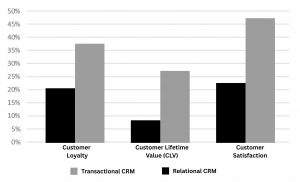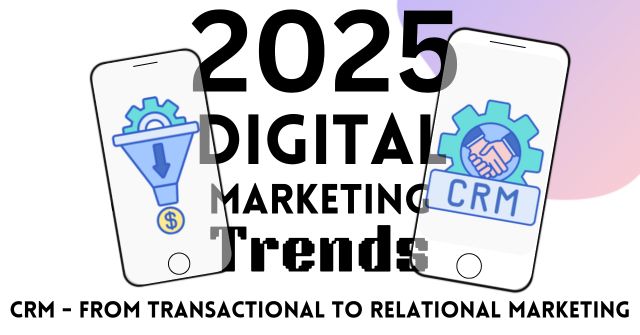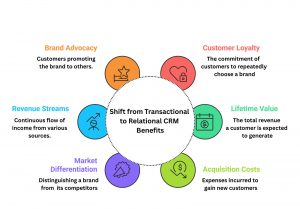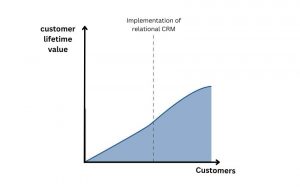Is CRM still merely a tool for managing sales, or is it something more?
As we move further into the digital age, the role of CRM has evolved far beyond a sales-centric tool. Once considered a way to track leads and sales transactions, CRM now holds the power to build enduring customer relationships.
” Customer relationship management is not just about closing deals, it’s about opening relationships that last. “
This quote state clearly how CRM is evolving from a transactional tool to a relationship-building powerhouse that fosters ongoing connections between brands and customers.
1. The Limitations of Transactional CRM in a Relationship-Driven World
The shift from transactional to relational CRM isn’t just a trend, it’s a necessity. Transactional CRM focuses on short-term sales goals and managing interactions based on single transactions. While this approach has been effective in the past, it no longer aligns with the demands of today’s consumers.
As the graph below shows, relational CRM outperforms transactional models in driving customer loyalty, increasing lifetime value, and improving overall satisfaction.

2. What Defines Relational CRM in 2025
As we step into 2025, relational CRM is not just about collecting data, it’s about nurturing connections. Relational CRM is built on the foundation of personalized, customer-centric interactions that foster deeper emotional connections.
It leverages data and technology, such as AI and machine learning to understand customer needs, predict future behavior, and create tailored experiences that resonate on a personal level. By focusing on relationship-building, relational CRM helps brands drive engagement, loyalty, and advocacy, all of which are essential for long-term business success.
As the image below shows, relational CRM impacts key areas such as brand advocacy, customer loyalty, revenue streams, and customer lifetime value while also reducing acquisition costs and enhancing market differentiation.
3. Metrics That Matter: From Conversions to Customer Lifetime Value
In the past, businesses measured CRM success by simple metrics like sales conversions. However, today, the real value lies in Customer Lifetime Value (CLV), a metric that evaluates the long-term worth of a customer based on their relationship with the brand.
Relational CRM shifts the focus to CLV by prioritizing long-term customer satisfaction, retention, and engagement. Unlike transactional CRM, which emphasizes one-off sales, relational CRM nurtures ongoing relationships, ensuring that customers continue to engage with the brand over time. As the graph below shows, companies that implemented a relational CRM approach see a significant increase in in the lifetime value of their customers, reflecting the true benefits of relationship-driven marketing.
4. Real Case Study: Brands that Leverage CRM and Relational Marketing
- Starbucks:
Starbucks began with a simple, transaction-based rewards program aimed at increasing purchases. Over time, it evolved into a powerful relational CRM strategy by using its mobile app to gather customer data and tailor rewards, offers, and experiences to individual preferences. This shift has turned occasional buyers into loyal brand advocates. Starbucks’ approach shows how personalization through CRM deepens emotional connections and encourages long-term engagement.
- Amazon:
Initially reliant on basic purchase tracking, Amazon transformed its CRM strategy by integrating AI to anticipate customer needs. Through machine learning, Amazon delivers highly personalized product recommendations and marketing messages, creating a uniquely tailored experience for every user. This data-driven, relational CRM approach not only boosts conversions but also increases customer satisfaction and loyalty by making each interaction more relevant and intuitive.
- Netflix:
Netflix moved from a generic subscription service to a relational CRM powerhouse by using advanced analytics to track user behavior and preferences. Today, Netflix curates personalized content recommendations, creates viewer-specific promotional campaigns, and continuously adapts its interface based on engagement. This strategy makes users feel understood and valued resulting in reduced churn and stronger emotional connections with the brand.
5. Too Long to Read?
-
CRM is evolving from a transactional tool into a relationship-building engine that drives long-term loyalty.
-
Transactional CRM is limited in a world that values customer engagement and emotional connections.
-
Relational CRM in 2025 focuses on personalized interactions, predictive insights, and long-term customer satisfaction.
-
Customer Lifetime Value (CLV) is the key metric that defines success in relational CRM.
-
Brands like Starbucks, Amazon, and Netflix are already leveraging relational CRM to create loyal customer bases.
5. Blog Video:
Please Leave a Comment & Check out other similar blogs:
2025 Digital Marketing Trends: Predictive Marketing with AI – Anticipating Customer Needs
2025 Digital Marketing Trends: How AI Is Revolutionizing Customer Experience
2025 Digital Marketing Trends: How to Build Customer Journeys






I really liked the shift from conversions to customer lifetime value you mentioned. Bro It feels like a much more sustainable and human approach to marketing, its less about the quick win and more about bulding lasting relationships
Glad that part resonated with you bro! Focusing on customer lifetime value really does make marketing feel more human.
Yazid, your blog is very insightful. I liked the Real Brands Example part you included, and especially the Netflix example because it shows how smart CRM and relational marketing can create strong bonds with customers.